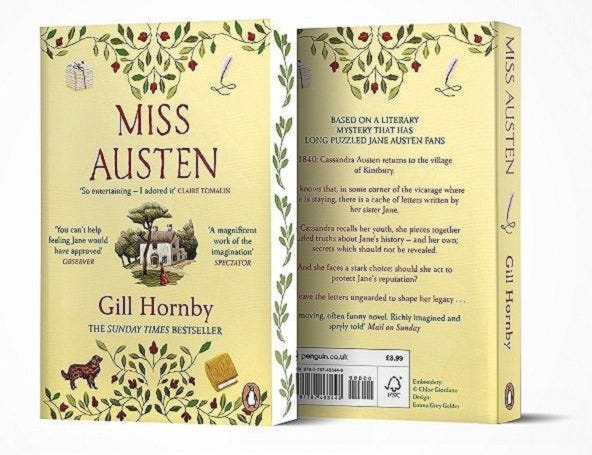When Success Comes with Critics: Lessons from Miss Austen
What the latest Jane Austen series teaches us about measuring author success
Hi everyone, Caroline here!
The recent television adaptation of Gill Hornby's novel Miss Austen has sparked fascinating conversations in literary circles.
I have the pleasure of knowing Gill Hornby. She is an Ambassador to the Jane Austen Literacy Foundation (of which I am Chair). Gill meticulously researches the real-life stories of my family and makes this history accessible through beautifully told fiction - her novels are highly regarded by my family and readers around the world. Gill is good company; interesting, witty and a great storyteller.
"A moving and beautifully crafted drama that brings fresh insight into the Austen family dynamics," praised The Guardian of the recent television adaptation Miss Austen. The four-part series, adapted from Gill Hornby's novel by screenwriter Andrea Gibb, has been lauded for its sensitive portrayal of grief, its exquisite period detail, and Rose Leslie's compelling performance as Cassandra Austen.
I have seen lots of positive commentary and opinion on social media, and also criticism. This mixed reception highlights a fascinating paradox in the literary world. Here we have Gill Hornby achieving what countless authors dream of: her novel was optioned for television and transformed into a high-profile drama that sparked widespread discussion. By almost any measure, this represents extraordinary success. Yet this same achievement has invited the very criticism that paralyzes so many writers.
For countless authors, having their work optioned for television represents the pinnacle of success. Gill Hornby achieved this dream. Her novel was not only optioned but transformed by screenwriter Andrea Gibb, who had previously worked on the Sanditon series, into a four-part drama that aired to considerable attention. By many measures, this is extraordinary success.
Yet Miss Austen has also faced criticism. Some viewers felt the dual timeline was difficult to follow. Others questioned the dramatic liberties taken with historical figures. Any portrayal of Jane Austen herself is inherently risky business as people have deeply personal relationships with our beloved author, and no interpretation will satisfy everyone's vision of who she was.
This presents a fascinating paradox: achieving what many authors would consider ultimate success, while simultaneously facing the very criticism that so many writers fear. The conversion of any story from book to screen necessarily requires adaptation, the tv series is not the same as Gill’s novel, but it’s viewed as Gill’s work, nonetheless.
Here's what Miss Austen teaches us about success: being optioned for television virtually guarantees mixed reviews. When your work reaches a broader audience through adaptation, it will inevitably encounter critics alongside champions, often more so than the book. The more visible your success becomes, the more varied the responses will be.
This reality should liberate rather than paralyze us. If we accept that chasing only positive reviews is futile, we free ourselves to pursue more meaningful measures of success. Jane Austen herself understood this principle intimately.
Even Jane Austen, now considered one of literature's greatest writers, received harsh criticism during her lifetime. The Critical Review dismissed Sense and Sensibility as having "little of story," while other contemporary reviewers found her work lacking in moral instruction or dramatic excitement.
Did Jane allow these criticisms to derail her? Quite the opposite. She stayed true to her vision, writing with wit and insight about the world she knew best. She focused on perfecting her craft rather than trying to please every critic. She understood something that modern authors would do well to remember: authentic success comes from staying true to your artistic vision, not from achieving universal approval.
Jane's approach offers a masterclass in focusing on what truly matters. She concentrated on her craft, trusted her instincts, and remained committed to her unique perspective on human nature and society. The result? Two and a half centuries later, her work continues to inspire, entertain, and influence readers worldwide.
Miss Austen, both as novel and television adaptation, exists because Jane Austen's work has endured so powerfully that writers like Gill Hornby find inspiration in her world. The mixed reviews the series has received don't diminish this achievement; they're simply part of the complex landscape any creative work navigates. I can’t betray confidences, but we expect to see more of Gill’s stories about my family dramatised on television.
Jane Austen didn't write for the critics of her day, and she certainly couldn't have anticipated the critics of ours. She wrote because she had stories to tell and characters who demanded life on the page. Her success wasn't measured by avoiding criticism but by creating work that has resonated across centuries.
For authors paralyzed by the fear of bad reviews, Jane's example offers a different path forward. Instead of asking "What if critics don't like it?" perhaps we should ask "Am I staying true to my vision?" Instead of chasing universal approval, we might focus on creating work that reflects our authentic voice and connects with our intended readers.
The success of Miss Austen, from novel to screen, reminds us that meaningful achievement often comes with mixed responses. Jane Austen understood that the pursuit of excellence and the acceptance of criticism aren't contradictory, they're complementary parts of a writer's journey. Two and a half centuries later, as we celebrate her 250th birthday year, the wisdom of her approach becomes ever clearer.
Perhaps that's the real lesson from Miss Austen: success isn't about avoiding critics, but about creating work so true to your vision that it continues to inspire long after the reviews have faded.
Caroline
You can watch my interview with Miss Austen screenwriter Andrea Gibb HERE
And view the Jane Austen Literacy Foundation Community episode discussions HERE.
Don’t forget to share in our weekly wins! Take a moment to here what we have going on and share your own wins so we can celebrate with you.






